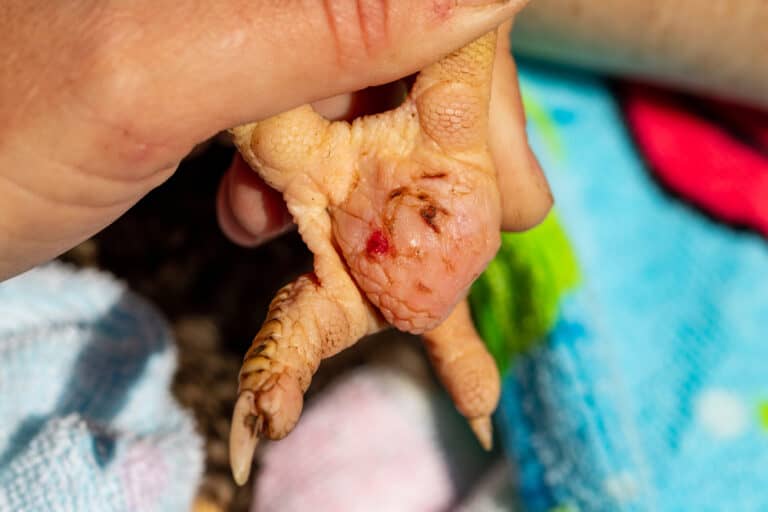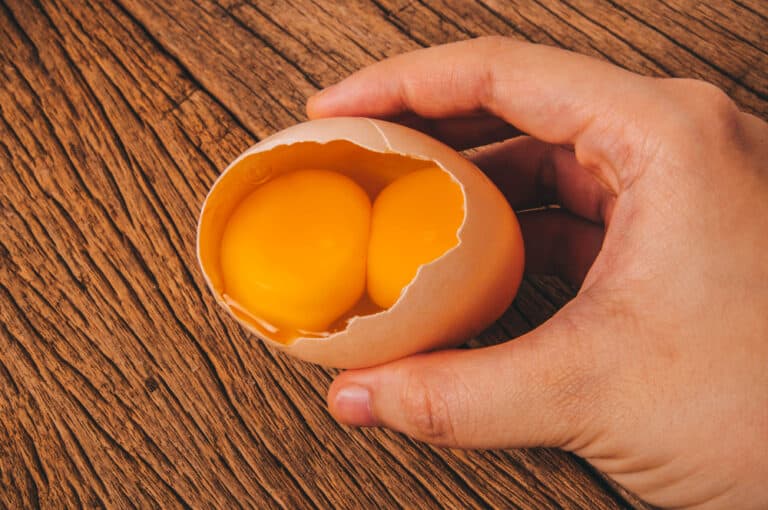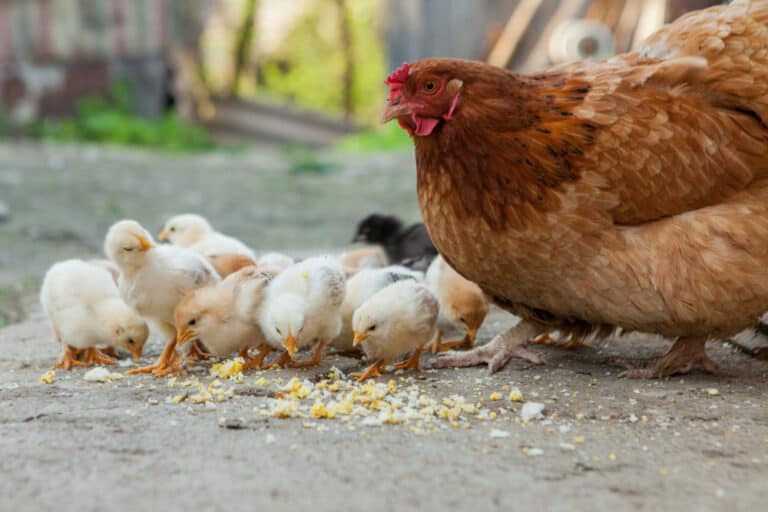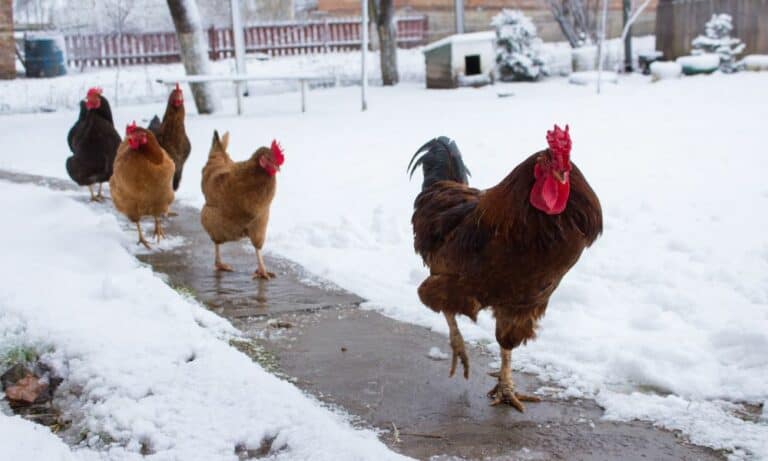Have you ever been to a farm and seen a chicken with bold spots? In most cases, people think the chicken is sick or has been attacked recently by a predator. Both reasons are quite valid. However, many do not know that chickens are prone to feather-picking!
So, why do chickens eat feathers? Unfortunately, feather-picking is quite a common occurrence in the poultry world, and it can be very stressful for new chicken keepers who do not know how to navigate and come to this problem!
Without further ado, let’s check what feather-picking is, why this happens, and how to counter it!
Feather-Picking and Cannibalism
Most animal species that live in groups have some sort of social hierarchy, such as wolves, baboons, and chickens. This hierarchy among chickens is often referred to as pecking order, and feather-pickling often accompanies it.
Although it is not surprising, chickens tend to pick their own feathers or other chicken’s feathers, which can be problematic.
A little bit of feather pecking “never hurt nobody”; however, if you notice that some of your chickens have large patches of bare skin and look sickly, you should be worried. One of the major issues with feather-picking is that it can lead to cannibalism.
Interestingly, chickens like to peck certain feathers, so the texture and color of feathers play a role. For example, hens like to peck short feathers rather than longer ones.
Also, according to Dr. Jacquie Jacob, the hens that lay brown eggs are more prone to feather picking than the ones laying white-shelled eggs. Picking feathers is more commonly seen in commercial barns than in free-range systems.
Regarding cannibalism, it is a major red flag because it is a “contagious” behavior, and chickens within a flock tend to emulate the behavior of other chickens. It is not restricted to chickens; cannibalism can happen in other types of poultry, such as ducks, turkeys, and quail.
Therefore, if one chicken develops the habit of picking others, the chances are that others will also follow suit. Ultimately, it will lead to chaos and the death of one or many chickens. Preventing cannibalism is easier to do than dealing with it after the fact.
Reasons Why Chickens Eat Feathers
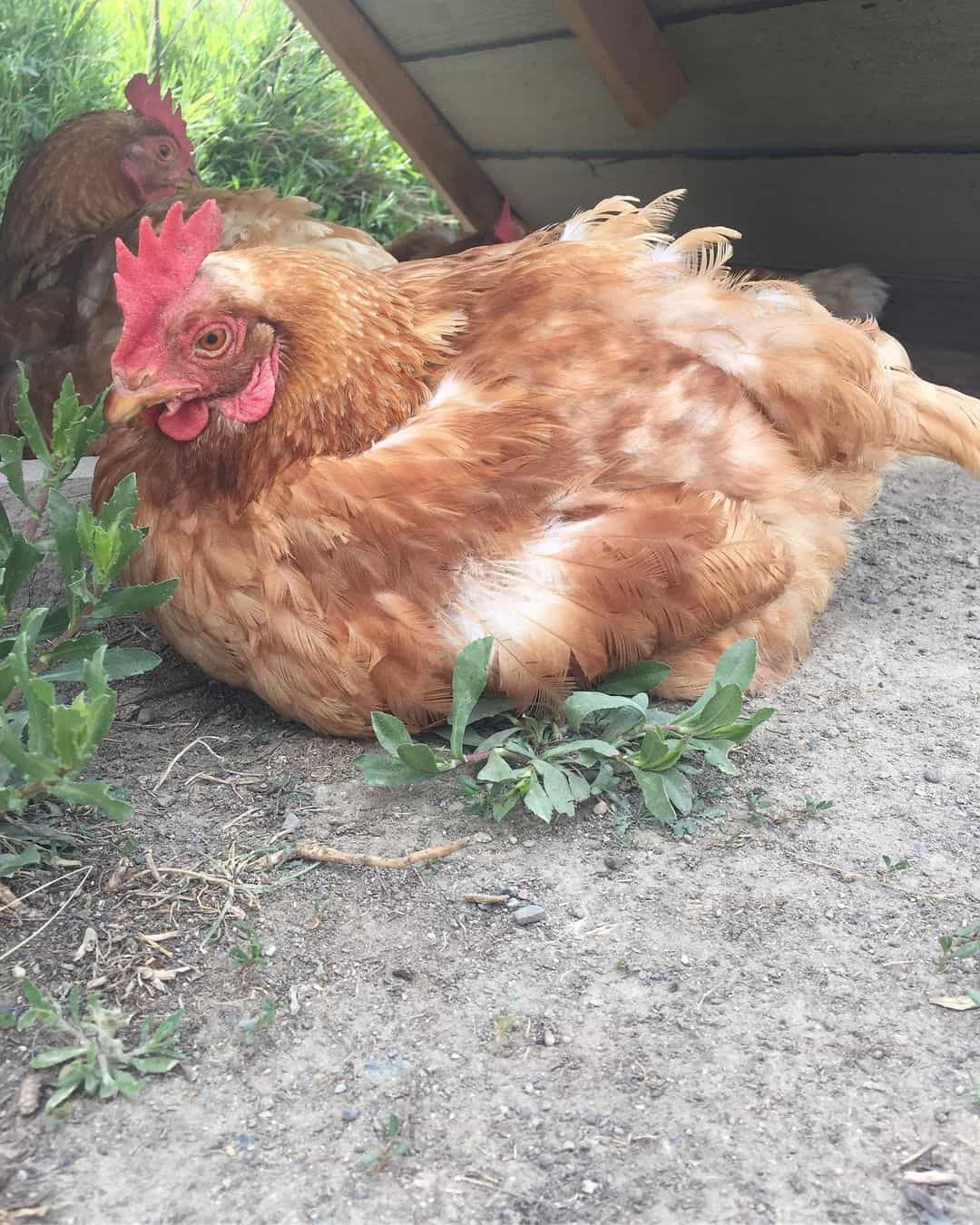
1. They Lack Protein
One of the most common reasons chickens eat feathers is the lack of protein. When it comes to feeding poultry, their daily diet should consist of complete chicken feed (90%) and treats and snacks (10%), such as fruits, vegetables, and insects.
Their protein intake is very important, not only for their health but also for their egg production and meat. Therefore, many chicken keepers try to find ways to incorporate protein into their diet and ensure high-quality egg production and meat.
However, if the chicken keeper is inexperienced or does not pay enough attention to the needs of his flock, that may result in feather-picking. Interestingly, this problem is mainly connected to poor diet and nutrition deficiency.
So, what does feather-picking have to do with protein? Well, feathers are packed with protein; in fact, they consist of 90% protein or keratin, a term you have probably heard in the gym or from a skincare brand.
When a chicken lacks protein, especially methionine, it will try to find a source of protein and what is better than its own feathers or its friend’s feathers! Generally, if the chicken’s diet is poor or has inadequate nutrition, it may lead to feather-picking.
- How to Fix Poor Nutrition?
Well, this one is very easy. The most important thing is recognizing or noticing the feather-picking problem and establishing its cause. Even if you are not sure the chickens are eating feathers due to a lack of protein, that will not be a problem; just do not go overboard with it.
The best solution is to increase the amount of protein-rich foods in your chicken’s diet. You can do that by giving the chickens fruits and veggies, such as kale, boiled eggs, fish, mealworms, pumpkin seeds, earthworms, sunflowers seeds, spinach, beans, and many others.
2. Too Much Light
Providing your chickens with too much or too little light often leads to feather picking. They prefer a combination of darkness and daylight to stay happy and produce eggs. If you give them bright light during the night, that will hinder their sleeping regime.
Constant exposure to bright lights will also wear them out, resulting in lethargy behavior.
On the other hand, they will become stressed if they are constantly kept in the dark. Chickens do not have very great eyesight, and staying in a dark place or coop for a prolonged period will result in cannibalism, especially if a large flock exists.
- How to Fix This?
The optimal solution for chickens when dealing with adequate lighting is to buy a supplemental light for the coop, which you can turn on during the early evening so there is no harsh transition from dark to light and vice versa.
Also, avoid buying bright lights and light bulbs with over 40 W. Ultimately, moderation is key, the optimal amount of light for chickens is around 15 hours, and you should not exceed it.
The remainder of the day should be darkness so they can rest and sleep.
3. Overcrowding and Stress
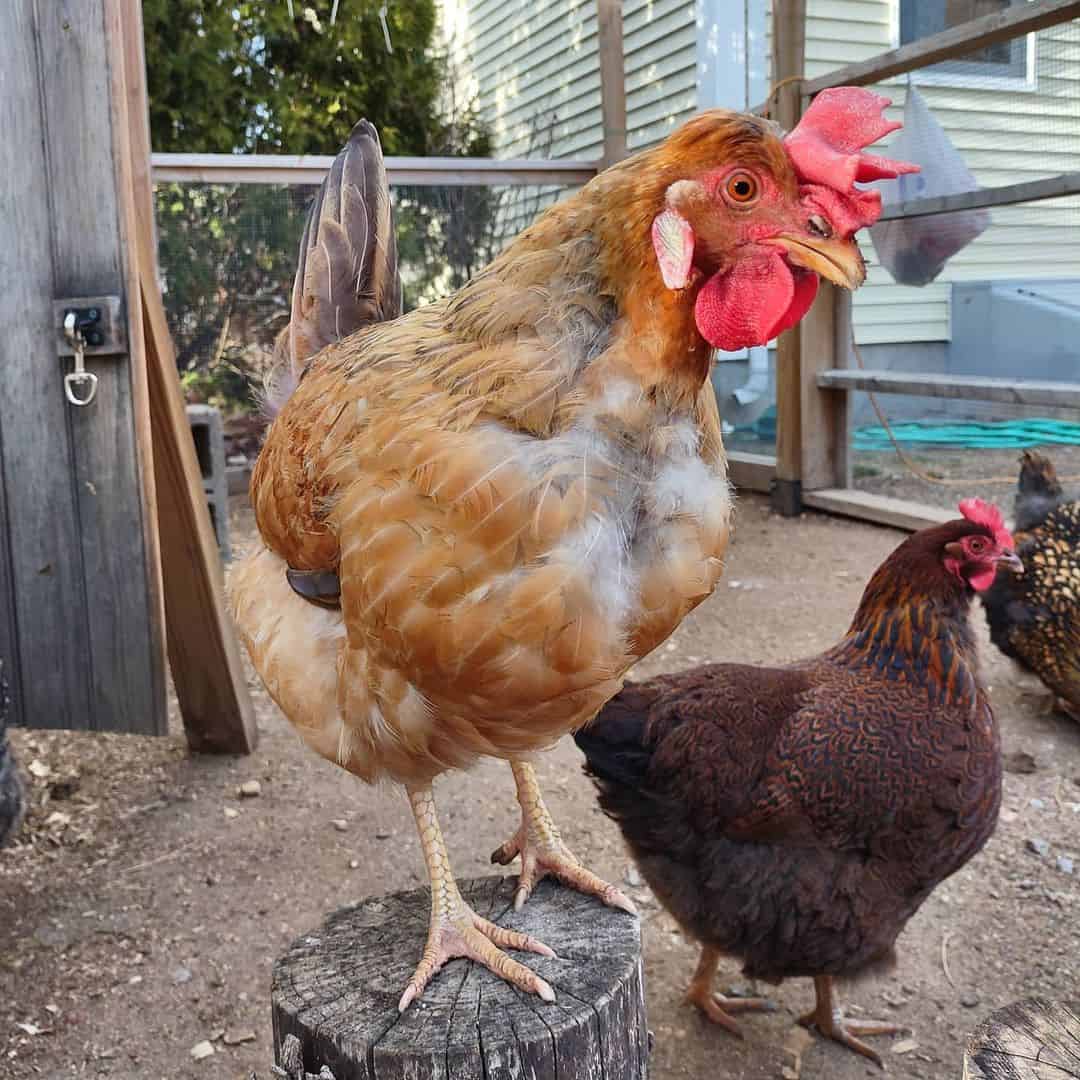
Another common reason why chickens resort to feather-picking or cannibalism is overcrowding. Various situations which cause stress to chickens may result in feather picking and, ultimately, feather loss.
Overcrowding is one of them, and your flock needs to have adequate conditions, which include a lot of space, fresh water, and a well-balanced diet. Their diet and happiness (although it may sound ridiculous) affect egg production.
If chickens are crammed in a small coop, where they spend most of their time, that may lead to increased competition for resources, such as food and water. The more dominant hens can become very aggressive and start bullying or picking other chickens which are docile.
They can also prevent the others from accessing the feeder and water, which will result in emaciated, underweight, and sickly chickens, and these chickens are usually the victims of bullying and cannibalism.
Other stressful situations for chickens may include a dirty coop, lack of food and water, and constant attacks from predators.
- How to Fix Overcrowding?
You can easily fix this problem by building or buying a larger chicken coop. There are different chicken breeds, some smaller than others, so consider that as well. For a standard-sized chicken, 4 square feet of coop space per bird will do the trick.
Also, the best option is to have free-range chickens because they are natural foragers and like to explore the world with their beaks. Alternatively, you can provide them with some run space to have some freedom still.
If you want to learn more about coop sizes, click here. When it comes to stressful situations, the best you can do is to try to prevent them from occurring; for example, keep your coop very clean and equipped with food and water. Also, it would be best to predator-proof the coop!
4. External Parasites
Chickens are hardy animals, but like many others, they are not immune to external parasites, such as lice and mites. Different types of mites attack chickens, but they also bring a lot of skin damage and stress to chickens.
For example, scaly leg mites tend to burrow under the chicken’s scales, causing discomfort and weakening their immune system. Similarly, lice feed on chickens’ blood, feathers, skin, and scales, detrimental to their health.
When a chicken suffers from lice or mites, it becomes lethargic due to the pain and other health issues caused by this nasty pest, such as deformed feet. In this stressful situation, chickens will resort to pecking.
- How to Deal with External Parasites?
Easy! The most important thing is to notice that your chickens have unwanted guests underneath their scales or in their feathers. Some of the symptoms include lethargic behavior, dirty-looking vent feathers, loss of appetite, feather loss, and others.
5. Molting
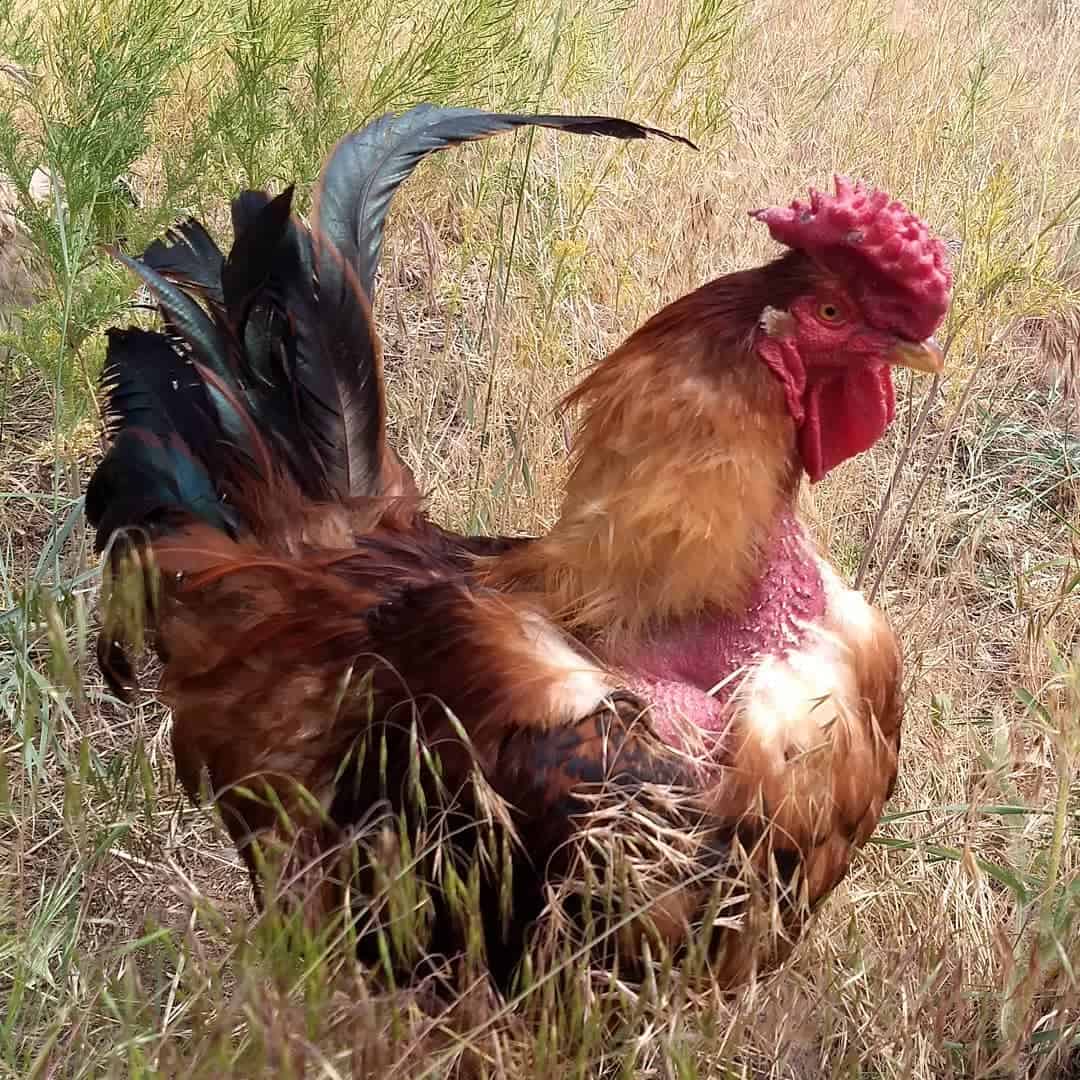
In case you are not familiar with the term, molting is a process common in poultry and birds and involves shedding or replacing old and damaged feathers with new ones. This process lasts from 8 to 12 weeks in chickens.
So, why do chickens resort to feather-picking during molting? Molting is a very tiresome and energy-consuming period during which chickens need protein-rich and nutritious food. They need a lot of nutrition to facilitate the growth of the new feathers.
If they cannot find it, they will eat their feathers to accommodate the lack of protein.
- How to Fix This?
Chickens usually enter the molting period in March and April, which should be completed by July. When they start molting, your only job is to increase their protein intake during those two months by giving them mealworms, nuts, fish, and other food packed with proteins.
6. High Temperatures
Overheating can be very problematic, just like freezing. If you live in a warmer area and your coop is often humid and hot, chickens can become aggressive and start to peck one another.
The best temperature for adult chickens is between 60ºF to 70ºF. This does not apply to baby chickens because they cannot regulate their own temperature and need a source of heat for four to six weeks.
- How to Fix this?
Obviously, you cannot affect or control the weather and the climate, but you can provide your chickens with a lot of shade, freshwater, and water-rich fruits and veggies to prevent dehydration and pecking.
7. Mixed and Large Flock
As noted, chickens have a social hierarchy or pecking order, which is very important within the flock because the order depends on individual recognition; when you have a large flock with various breeds that can become chaotic.
The birds within a flock will not be able to recognize the other flock members and can become less aggressive and very tolerant. In order words, the established order within a flock will be ruined, yielding various consequences.
Furthermore, if your flock includes chickens of different ages or chickens that have been reared together, that can also result in feather-picking or other issues.
Chickens like to emulate the behavior, and if you put an old and nearly feather-less chicken in the coop, it might spark other chickens to pluck their own or flock mate’s feathers due to curiosity.
- How to Deal With This Problem?
According to research, the optimal size for a flock is around 30 birds per flock. Also, it is not suggested that you mix extremely aggressive breeds with the ones known as very friendly and docile.
Before buying chickens, it would be good to inform yourself about certain breeds and how they behave with other breeds.
8. Boredom
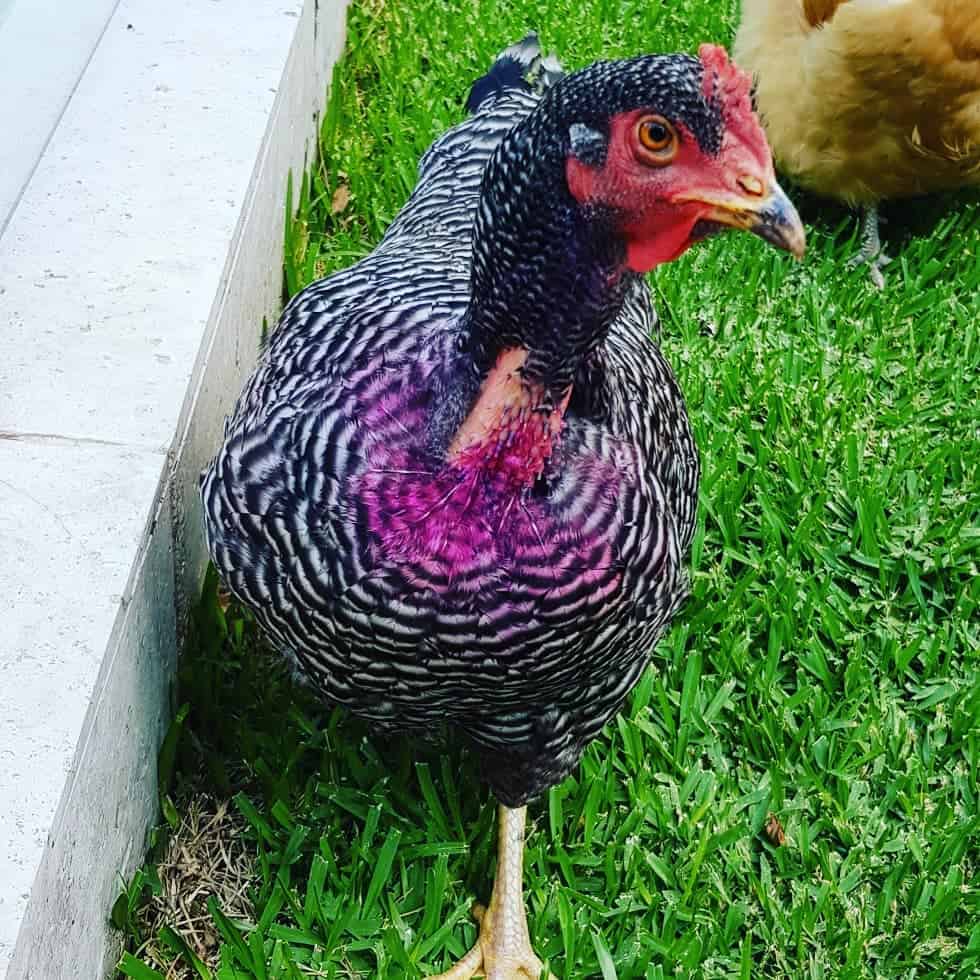
Even though it may sound unusual, boredom can be why your chickens are pecking each other. It is usually a combination of various factors, such as boredom, high temperatures, and a large flock crammed in a small coop.
Chickens can easily get bored when constantly confined in a small space.
- How to Cure Boredom?
Well, the best solution is to let the chicken move freely. You can make a run space for the chickens where you can monitor them and allow them to forage.
In addition, you can give them snacks, such as ice cubes with mealworms, which will attract their interest and hold their attention for a longer period!
Why is Feather-Picking So Problematic?
The main reason you need to prevent and stop your chicken from picking others is cannibalism, which is a learned behavior.
Furthermore, constant pecking can lead to skin irritation and infection, weakening the chicken’s immune system and making it prone to various sicknesses.
Conclusion
There are several reasons chickens eat feathers and peck on each other: boredom, external parasites, too much light or too little, overcrowding, high temperatures, mixed and large flock, molting, poor nutrition, and stress.
If you notice your chickens eating feathers, we suggest you get to the bottom of that problem immediately! Have you ever seen chickens eating their feathers? Please share your experience! If you have any comments, do not hesitate to share them.

